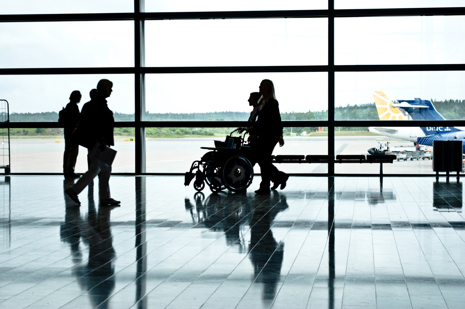
The aviation industry and the disabled community welcomed the publication of the report of the UK Aviation Accessibility Task and Finish Group (AATFG) chaired by Baroness Tanni Grey-Thompson, on Wednesday 16 July.
The AATFG was established by the UK government in 2024 and comprised key advocates from the disabled community, along with industry representatives. It was chaired by Baroness Tanni Grey-Thompson, a decorated Paralympian, and noted campaigner for people with disabilities.
“We’d like to thank Baroness Grey-Thompson for her leadership of the AATFG. While being encouraged that the report notes the industry has ‘made strides to reduce barriers for disabled passengers’, we acknowledge the Baroness’ comment that there are ‘still too many gaps and poor experiences’. We agree with her that one poor experience can be enough to stop someone flying forever, and we are committed to eliminating such cases.,” commented Linda Ristagno, IATA’s representative on the AATFG and chair of IATA’s disability working group.
The report received some 168 suggestions which were categorized into recommendations covering issues such as:
The AATFG also identified three key challenges facing the industry: the potential misuse of wheelchair services at the airport, where some travelers take resources away from those who genuinely need them; the necessity of advanced notification for assistance services, allowing airports and airlines to prepare better; and the international nature of the aviation sector, which requires all priorities to be addressed on a global and multilateral basis. While these challenges do not excuse any negative experiences faced by passengers with disabilities, it was important for the group to recognize them.
“The Baroness wrote in her forward that ‘I have no power to enforce any recommendation, so it is based on the goodwill of the industry who want to do better’,” notes Ristagno. “We would like to assure the Baroness and all the community of persons with disabilities that we are deeply committed to doing better, and we will work towards implementing as many of these recommendations as possible as quickly as possible. For example, IATA has launched an Accessibility Task Force with members of the AATFG and is already reviewing some of the recommendations of the report.”
“In addition to the key recommendations of the report, I’d like to point out two other important points,” says Ristagno. “The first is language and communication, and the desire of the community to move from descriptions of ‘special assistance’ and ‘passengers with reduced mobility’ to references to ‘assisted travel’ or ‘assistance services’. At IATA we will strive to raise awareness of this preferred language. Secondly, the report calls for an industry-led aviation accessibility working group to be established. We already have such a group working at international level and we look forward to harmonizing their efforts with any UK group that is established.”
Additional Information: